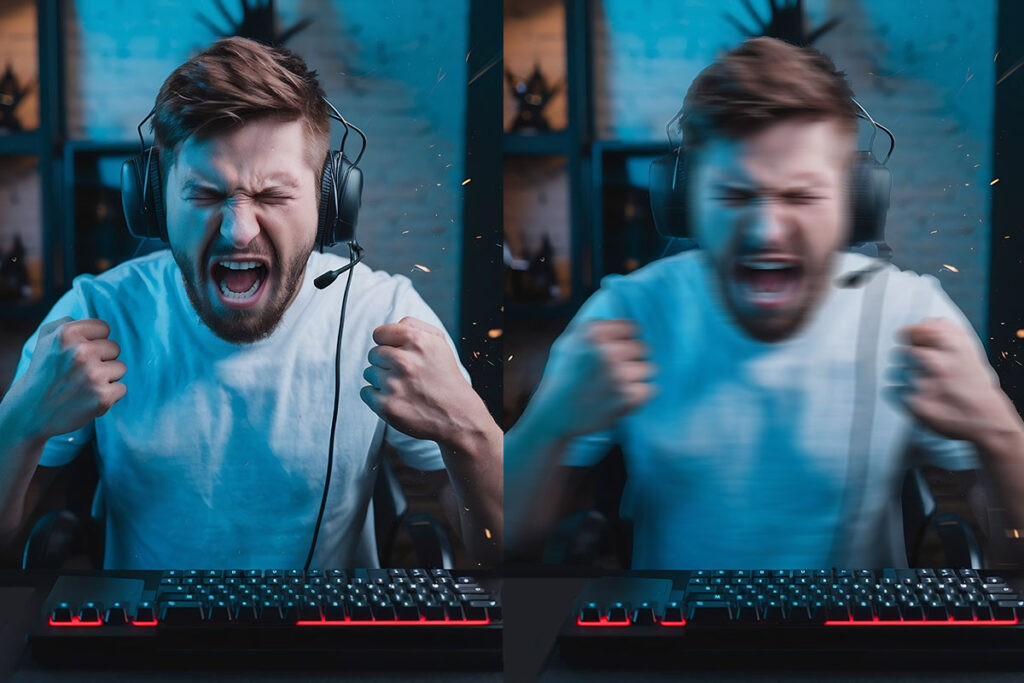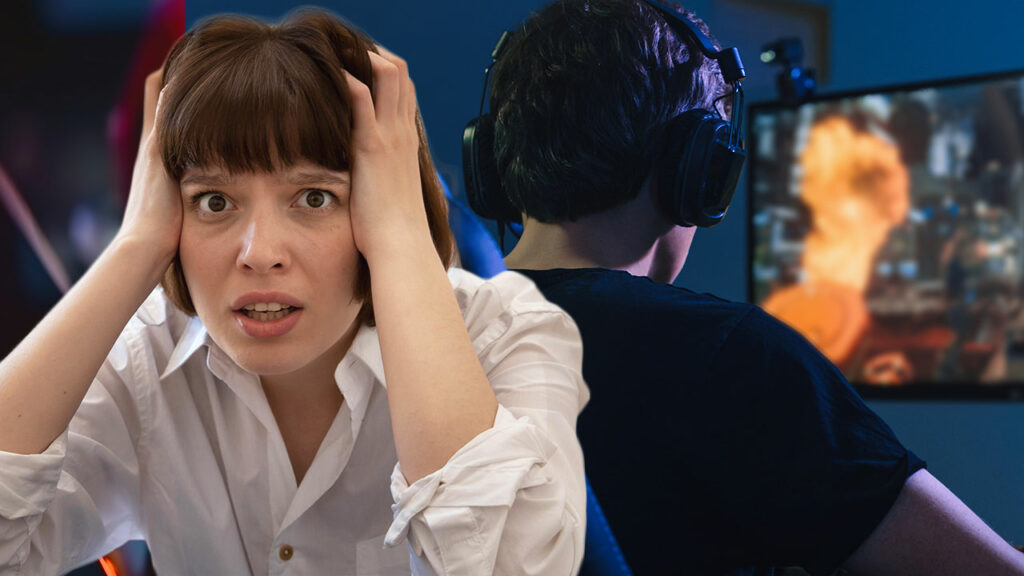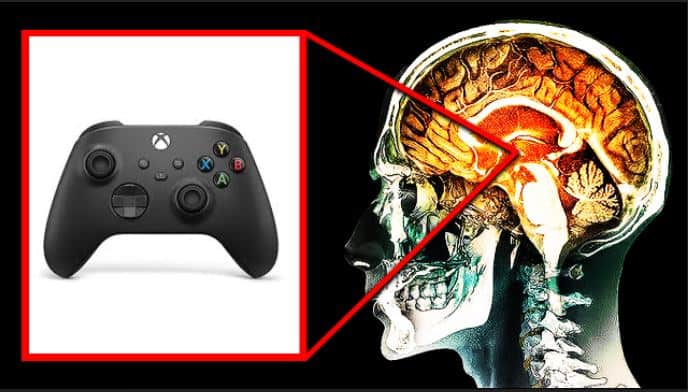
Gamer Rage: Why Do Video Games Make Kids Angry?
Are video games making your child angry and aggressive? Has your home turned into a battleground? At Game Quitters, we’re often contacted by parents who don’t know how to deal with gamer rage.
So, what does raging mean in gaming, why do gamers rage, and why is gamer rage so common? This article explains the causes and consequences of gamer rage and includes six ways to deal with it.
What is gamer rage?

Gamer rage is a term used to describe the uncontrolled anger, verbal, and/or physical aggression that some gamers experience while playing video games. Examples of gamer rage include:
- Shouting and screaming
- Swearing
- Temper tantrums
- Intense frustration
- Heated arguments
- Sudden outbursts
- Hostility
- Irritability
- Threatening others
- Throwing or breaking objects
These, often frequent, flareups can put a huge strain on family relationships. And previously happy homes can become toxic and tense.
What causes gamer rage?
There isn’t one specific cause of gamer rage; it affects different players in different ways. But there are some typical triggers that can make players become angry and aggressive. These include:
- A slow or broken Wi-Fi connection
- Issues with gaming software or equipment
- Losing a match in a multiplayer game
- Lack of teamwork – others not pulling their weight
- Suspecting opponents of cheating
- Reading nasty comments in voice chat
- Being mocked by other players
- Having to stop to eat, study, work, sleep, or do household chores
- Losing progress due to a lost save
- Not reaching the next level because the game is too challenging
- Unwanted distractions from parents or siblings
In extreme situations, some gamers may even become violent.
A parent’s story of gamer rage

This real-life situation was posted on our Game Quitters parent support Facebook group by a concerned parent:
“Today, my teenage son was cursing while playing the video game after he did not go to high school for two days. This was after 9.30p.m. After playing more than 8 hours of gaming, I went and told him firmly that he cannot curse, and I took out his internet. This escalated, and he started crying, cursing, and threatening to spill the water. We have holes in the walls and broken mirrors in the home. I am sick and tired. I told him to stop doing this.
I did not give the internet, and he repeatedly spilled water all over. Eventually, he started threatening to report me to child protection services. I am appalled by this behavior. I wonder how to make this teenage boy realize what he is doing in the family now and also for his own life. I am very saddened. This behavior is almost reproducible every time you stop his internet or discuss with him about his attitude.
And it’s not just parents who are frustrated by gamer rage, we’re also contacted by gamers who want to get their anger under control. Common questions include, “Why do I get so mad at video games?” and “I really want to know how to not rage at games and start enjoying them again”.
How to stop gamer rage

As a parent, it can be distressing to watch your child get so annoyed. You may have tried to reason with them during an outburst, but that can often make things worse. Desperate parents often ask us, “How do you cure gamer rage?”
There isn’t a one-size-fits-all solution for anger management. However, the advice below has helped other families deal with gamer rage. In our experience, it’s best to discuss these tips with your child when they aren’t playing video games, rather than in the middle of a gaming session.
1. Recognize the warning signs
Help your child notice when their behavior is starting to spiral out of control. If they recognize the warning signs – such as increased heart rate, clenched jaw, sweaty palms, breathing rapidly, or trembling or shaking – they may be able to do something to stop it from escalating.
2. Have a break
One way they can take action is to step away from the screen. Having a break from whatever is triggering their anger can help defuse the situation and improve their mood. This isn’t an easy thing to do, which is why recognizing the warning signs (as mentioned above) is so important. Another way to stop anger escalating is to take regular breaks rather than have extended gaming binges.
3. Switch games
Do certain video games have a negative effect on your child? Are there any patterns to their mood swings? Sometimes, violent video games can spark anger and aggression, especially if they aren’t age-appropriate. There are many fun and exciting games available that are non-violent. Encourage your child to switch to non-violent video games, such as Minecraft or Fall Guys, to minimize the risk of hostile behavior.
4. Release pent-up energy elsewhere
One of the most effective ways to reduce gamer rage is to strike a healthy balance between gaming and other leisure activities. There are so many hobbies available to children and teens other than playing video games. Sports like running, swimming, or boxing can work off anger and frustration. Or putting on some upbeat music to sing and dance is a great way to release pent-up energy.
5. Prioritize sleep
Does your child regularly stay up late or even wake in the night to continue playing video games? If so, this will probably be contributing to their gamer rage, as lack of sleep can cause increased anger, aggression, and irritability. Explain the importance of prioritizing sleep so they feel well rested and in a good mood when they start gaming the next day. The best way to achieve this is to have a regular bedtime and wake-up time.
6. Do a digital detox
If you’ve tried the above tips but your gamer is still having angry outbursts, try a digital detox. This involves your child taking a total break from playing video games for at least 30 days. Although it’s not an easy process – and their gamer rage may continue for a while before it starts to get better – after this period of abstinence they’re likely to feel happier, and the atmosphere at home will improve.
Need help?

Gamer rage can put a significant strain on family relationships, especially if the individual has gaming addiction. When your child is unable to stop playing video games (even if they want to) it can lead to even more frequent emotional outbursts.
And often, people with unhealthy gaming habits refuse to accept that their behavior is a problem, which makes it very difficult to reason with them. In fact, around 90% of the gamers we help start in denial, but we have a system to take them from denial to acceptance.
Our RECLAIM family program is a proven method to reduce anger and conflict, manage problematic gaming, and get your gamer back.
To find out more, apply for a Gameplan strategy call.
Together, we’ll create a customized plan to help get their gamer rage and gaming habits under control, so you can start to rebuild your relationship.
Please note that spaces are limited, and we can’t accept all applicants.
